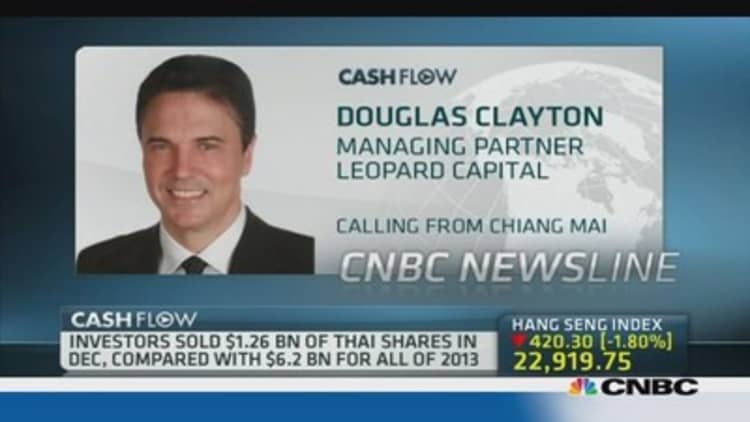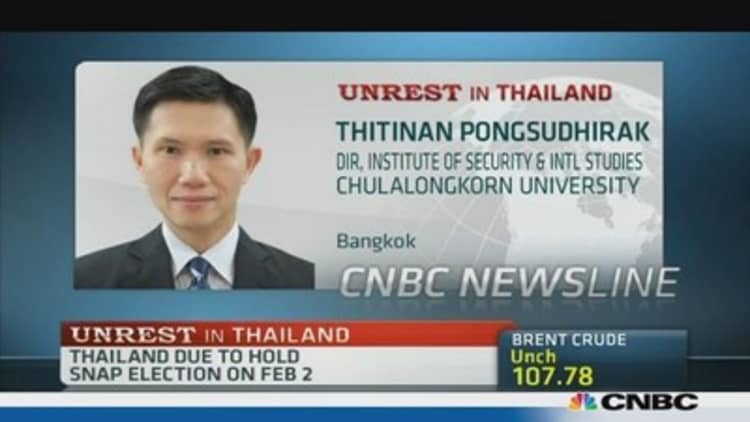Bargain hunters eyeing beaten down Thai shares should hold their fire for now as the political turmoil might be different from previous episodes, analysts said.
The benchmark SET index shed 0.6 percent to 1223.00 midday Friday, after dropping 5.2 percent Thursday, for an around 16 percent drop since protests began in late October. The baht has lost around 6 percent of its value against the dollar since the beginning of October, trading around 33.00, its weakest since early 2010.
Foreign investors pulled around 194 billion baht, or $6 billion, from Thai shares in 2013, reversing the inflows of the last four years, noted Douglas Clayton, managing partner of Leopard Capital.
(Read more: In Thailand, rallying cry is against too much democracy)
"It's likely to get worse before it gets better. It's a real standoff," Clayton told CNBC. "There's not much more foreign money that can pull out, but the market can drift down further on bad sentiment if the political situation is not resolved."
(Read more: Why Thailand's politicalstrife is far from over)
Thailand is no stranger to political turmoil, but while its springy stock market usually makes a quick recovery, there are few signs of a resolution on the horizon.
"The situation here in Bangkok continues to be tense and murky because we don't know how bad the protests are going to be," Thitinan Pongsudhirak, director of the Institute of Security and International Studies at Chulalongkorn University, told CNBC.

The protesters plan a mass protest on January 13, vowing to "shut down Bangkok," he noted. "We will see all kinds of costs incurred by that."
The protests were triggered by parliament's consideration of a government-backed amnesty bill that could have allowed former Prime Minister Thaksin Shinawatra, who was ousted in a 2006 coup d'etat, to return home without facing time in prison for a 2008 graft sentence. The bill also would have granted immunity to politicians implicated in 2010 violent protests which killed about 90 people.
(Read more: Violent protests expose cracks in Thai economy)
In early December, Prime Minister Yingluck Shinawatra called a snap election in an unsuccessful effort to defuse protests. Since then, the main opposition, the Democrat party, has said it will boycott the election and protesters have prevented candidates from registering.
The Election Commission is expected to announce Friday whether it will extend the registration period.
"We've had this rocky road in Thai politics for some time," Thitinan said, noting the country has faced a coup around every 4.3 years for the past 80 years.
"But at the end of the day, there's some backstop, there's some cushion," he said. "But this time, I think we are seeing a real litmus test for electoral democracy and the shock absorbers are not enough to withstand (it)," he said.
(Read more: Thailand's army moves to allay coup fears)
Thailand's economy unexpectedly slipped into a recession in the second quarter of 2013. At its November meeting, the central bank cut its 2013 economic growth projection to 3.0 percent from 3.7 percent and lowered its 2014 forecast to 4 percent from 4.8 percent.

Thailand also has a current account deficit, leaving it exposed to potential fund outflows as the U.S. Federal Reserve tapers its asset purchases.
(Read more: Thailand's investors spooked by 'forgiveness')
To be sure, with the turmoil weighing domestic demand and imports, the trade balance has improved, noted Hartmut Issel, head of wealth management research at UBS.
"If that continues, we shouldn't worry so much about the current account, but certainly we should worry about growth," he told CNBC.
"The real question I think that is on everybody's mind is whether the army will really step in," Issel said. While a military presence might put a stop to protests, it wouldn't ease the uncertainty in markets, he added.
"The military in charge is not a sustainable solution," he said. "The military will not govern for the next 20 years. So something has to follow after that and people will still not know what it is."
Others are also concerned about a possible intervention.
(Watch now: Opportunities in Thailand's political gridlock)
"It would give a temporary respite but I think there would be a second act, where the people from upcountry would respond to that and Thailand would then be placed into an even more dangerous situation," Leopard's Clayton said.
Amid the uncertainty, Thai markets will eventually offer a bargain hunting opportunity, just not yet, said Rahul Chadha, head of Asia-Pacific Investment at Mirae Asset, which has around $18.63 billion under management.
"At some point, probably 5-7 percent lower from now, you'll see investors doing bottom fishing," he said, advising buying on a two-year time frame.
—By CNBC.Com's Leslie Shaffer; Follow her on Twitter @LeslieShaffer1

